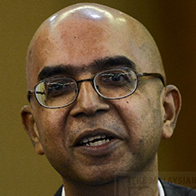John F. Kennedy’s 1961 vision of putting a man on the moon energised the United States to “catch up to and overtake” the Soviet Union in technological prowess. The Soviets humiliated the US by being the first to put a human in space. Kennedy’s vision spurred the US into action to achieve technological domination.
Tun Abdul Razak’s 1971 vision, in the New Economic Policy similarly energised Malaysia. Razak wanted to eliminate poverty and to eliminate the association of occupation (and income) with race. Razak’s vision spurred the nation to recognise and reverse the effects of race-based choices with inequality-reducing choices.
The NEP reduced the income inequality between the Malay and Chinese communities. It succeeded so well that at the end of the NEP in 1991, the government decided to stop reporting figures for the Malay community. The data was hidden because the government lacked political will to end handouts which increased income inequality.
To avoid making the hard political choice of ending benevolence to rich Malays the government combined “other Bumiputera” with Malays and reported only figures for Bumiputera, Chinese, Indians and Others in national reports. Energising vision gave way to superficial vision.
Vision 2020, a great document, was still-born in 1991, probably because its goal is a “fully developed country”. What does that mean? [Did you know it calls for “a society that is democratic, liberal and tolerant”?]
Economically, Malaysia is fairly successful. Unemployment is low, life expectancy is high, our environment is relatively okay and we are a magnet for foreign workers.
Our growth has been mostly due to Tun Dr Mahathir Mohamad’s choices during his 22 autocratic years as prime minister. He attracted foreign investment. He provided cheap land, electricity, water, labour and tax holidays plus institutionalised religious repression, autocracy under a veneer of democracy and denial of labour rights. Luckily for us, Singapore had no land; other Asean countries were unstable; Cabinet members were easily appeased.
We may note in passing that Dr Mahathir used Islam as the veneer for crony capitalism which in turn birthed endemic corruption. Tun Abdullah Ahmad Badawi tried to counter this with Islam Hadhari. His vision was “to demonstrate, by word and action, that a Muslim country can be modern, democratic, tolerant and economically competitive”. He failed.
The result is a nation with massive income disparities and hordes of conflicted citizens.
Hordes, across all ages, classes and ethnicities, are saying “enough of unjust policies”. Now people are eager to move from competing for wealth to sharing wealth.
The result is also a nation with a labour-averse citizenry – because “labourers” are thought of as people who must endure abuse without representation; labouring is thought to be suited only for foreigners willing to accept low wages, long hours and tough conditions. That’s why we have over 6.7 million foreign workers in Malaysia.
Now many of us are rich enough to think beyond our own survival and to think beyond braggart greatness.
We wonder if Malaysia’s growth will continue to be driven by cheap foreign labour. Is the role of citizens to be providers of food, housing, transport, supervision, medical and financial services for foreign workers? Or will we establish a respectable minimum wage and act vigorously to stop the abuse of labour and halt the widening of income gaps between the rich and the poor? What is the vision?
Our government lacks the political will and intellectual prowess to make tough choices. We have ministers like Datuk Seri Idris Jusoh, Datuk Seri Shahidan Kassim, Datuk Seri Ahmad Zahid Hamidi and Datuk Ahmad Maslan.
Idris says our education is world class despite mountains of data to the contrary. Shahidan claims the “indelible” ink used in GE13 was made delible for reasons of health and safety. Zahid abuses his power by imposing extra-judicial punishments on those who exercise freedom of expression. Ahmad, after bungling the GST implementation, says the long-entrenched service charges at hotels and restaurants is “optional”.
The vision of these blind men is to remain in office by bragging about minor wins and brushing off major losses. Datuk Seri Najib Razak recognises this. That’s why he’s appointed non-elected ministers to do the hard work of visioning and fighting corruption: Idris (Pemandu), Datuk Seri Abdul Wahid Omar (finance) and Datuk Paul Low (integrity).
Opposition lawmaker Liew Chin Tong has written that the 11MP is irrelevant because the 10MP failed and because governing based on long-term planning is outmoded.
Considering the calibre of elected ministers, I suspect Liew’s judgment of the 10MP is correct. But plan-based governing is at the core of Malaysia. Without the plan which is a vision-based blueprint, the civil service will stall. We can at least hope that a few good civil servants will stand up to blind ministers.
Blind activist Helen Keller said the only thing worse than being blind is not having a vision. We’ve got blind ministers. Must we also be without an economic vision? – May 7, 2015.
* This is the personal opinion of the writer or publication and does not necessarily represent the views of The Malaysian Insider.


Comments
Please refrain from nicknames or comments of a racist, sexist, personal, vulgar or derogatory nature, or you may risk being blocked from commenting in our website. We encourage commenters to use their real names as their username. As comments are moderated, they may not appear immediately or even on the same day you posted them. We also reserve the right to delete off-topic comments